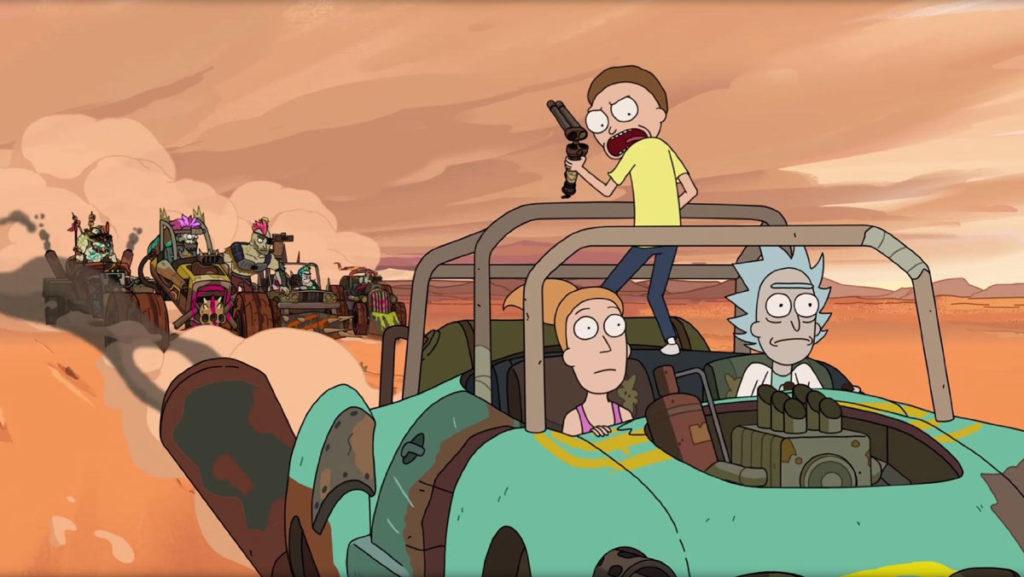“Rick and Morty” returned from its nearly two-year break to both praise and scrutiny from its fans. It managed to birth memes and annoyance from everyone.
For those who are unaware, the show follows Rick Sanchez (Justin Roiland), an alcoholic supergenius, as he travels the multiverse with his nervous grandson, Morty (also voiced by Roiland). They go on all sorts of adventures that always seem to lead to dread and horror for Morty.
“The Rickshank Rickdemption” starts the season on a fantastic foot. This is easily one of the best episodes of the show to date. Rick from dimension C-137 must escape from a Galactic Federation prison before rescuing his grandchildren from the Citadel of Ricks, an interdimensional capital for Ricks and Mortys from different realities. The episode has become famous for Rick’s proclamation that his series arc is to get Szechuan sauce, a promotional Chicken McNugget sauce for the film “Mulan.” However, it also exemplifies the show’s antagonistic approach to character development. Instead of trying to make Rick a likable lead, the show attempts to make him as despicable and inexplicable as possible. During his escape, Rick presents to the audience a tragic backstory, only to reveal it’s a blatant lie. Later in the same episode, he saves Morty and his granddaughter, Summer (Spencer Grammer), but then claims that it was just to maintain trust within the family; he says he only cares about the Szechuan sauce.
However, while “The Rickshank Rickdemption” serves as a perfect example of how character development previously functioned on the show, “Rest and Ricklaxation” goes in a new direction. Rick and Morty go to an intergalactic spa that purges them of their toxic emotions. However, these emotions form their own consciousnesses and travel back to haunt Rick and Morty. The episode reveals that Rick does truly love Morty, but Rick actually sees this as a character flaw. His most pure version of himself is just a devil-may-care scientist with no personal connections. The ultimate message of the episode is to embrace one’s toxic side, which is an unusual lesson in any form of media. However, how Rick felt about Morty had only ever been implied throughout the show. Before, it could oscillate between Rick showing real care for Morty and leaving him for dead. This created suspicion in the audience as to how Rick truly felt, but his emotional connection to Morty was never confirmed. For better or for worse, by revealing Rick’s true feelings, a sense of uncertainty has been lost.
The writers also explored Rick’s manipulation of his family this season. Rick finally manages to get Morty’s father, Jerry (Chris Parnell), kicked out of the house, setting off a chain of events across the season. Because the writers thrusted Rick’s manipulation to the forefront, the audience now knows Rick’s goal is total control of his family. These clarifications are all very satisfying and believable, but uncertainty is part of what makes the show engaging. It’s impossible to tell what Rick is actually trying to achieve at any given time, if anything.
To this season’s credit, it contains some of the show’s best episodes yet. “Pickle Rick” is a great episode about Rick turning himself into a pickle and then having to escape a sewer. It’s pure, unadulterated fun. “The Ricklantis Mixup” is on the other end of the spectrum. It’s made up of a variety of stories about the the Citadel of Ricks and is one of the darkest episodes of the show to date. It explores this absolutely dystopian world that manages to oppress Ricks and Mortys alike. Resistance is futile, and whatever happiness does exist is extracted into a candy bar for the rest of the Ricks to enjoy. The episode is the best example of the show’s ethos: everything is terrible, no one is inherently good, the universe is unfair, and the only person who even understands what is happening is a sociopathic, alcoholic, aging scientist. Even if it is dark, there’s a comfort in watching media that revels in the meaninglessness of life. Instead of being depressing, the extreme, pervasive nihilism is cathartic. Unlike other shows, the meaninglessness of life is treated as a joke, and instead of a feeling of helplessness, the audience is expected to endure.
Unfortunately, on a show like “Rick and Morty,” anything less than great has become a disappointment. This is less of an issue when the show lives up to this expectation taking the show in fascinating, and often shockingly depressing directions. However, when the show is merely good, it’s a letdown. The finale is a prime example: It’s fun to watch and ties up the major thematic threads of the season, but it doesn’t reach the bombastic heights of the season two finale.
Ultimately, the show hasn’t gotten worse, but the elongated break between seasons has set standards astronomically high.




















